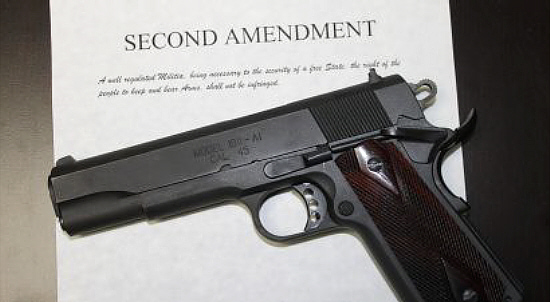

Heavy Hitters Line Up in Support of U.S.
Gunmakers in Lawsuit Challenge

A significant case involving the Mexican government's lawsuit against several
gun manufacturers is attracting support from major gun rights organizations.
By Dave Workman. Dec 5, 2024
Article Source
When it comes to gun rights litigation, the nation's "heavy hitters" are lining up behind the firearms industry and federal law by submitting amicus briefs to the U.S. Supreme Court, which will hear arguments next March 4 whether a lawsuit filed by the Mexican government against U.S. gunmakers should be thrown out or allowed to move forward.
The case is known as Smith & Wesson Brands, Inc., et.al., v. Estados Unidos Mexicanos.
The Second Amendment Foundation (SAF), National Shooting Sports Foundation (NSSF) and National Rifle Association (NRA)—in cooperation with the FPC Action Foundation and Independence Institute—have all submitted briefs to the high court this week.
Interest in this case is not surprising, as the initial lawsuit by the Mexican government is not only a direct challenge to the Protection of Lawful Commerce in Arms Act (PLCAA), which protects the firearms industry from harassment "junk" lawsuits, it also would undermine Congress' authority to adopt any regulatory legislation, say critics.
Mexico's lawsuit was originally rejected by U.S. District Judge Dennis Saylor—a George W. Bush appointee—in 2022. However, his decision was appealed to the liberal Boston-based U.S. First District Court of Appeals and overturned earlier this year. The lawsuit was originally filed in August 2021, seven months after the Joe Biden administration came into power.
MEMBERS OF CONGRESS, STATE AGs FILE AMICUS BRIEFS
Over the years, President Biden, among others, falsely claimed the firearms industry enjoys immunity from liability because of the PLCAA. As noted in the writ of certiorari filed by Smith & Wesson and its companion companies, "To be sure, PLCAA is not a blanket shield from any and all liability. If a member of the firearms industry violates the law, the Act's shield may lift. As relevant here, PLCAA provides an exception—the "predicate exception"—for when a company (i) "knowingly" violates a state or federal firearms law, and (ii) that violation "was a proximate cause of the harm for which relief is sought."
SAF Executive Director Adam Kraut, a practicing attorney, summed it up: "Allowing Mexico to pierce the Protection in Lawful Commerce of Arms Act would result in foreign countries dictating the types of arms that should be commercially available to Americans. These types of lawsuits, like the one brought by Mexico, are designed with one purpose in mind – to bankrupt the firearms industry and drive it out of existence. Such a result is untenable and directly impacts the right to keep and bear arms. SAF will continue to assert itself in matters that impact American's ability to acquire arms to exercise their Second Amendment rights."
Lawsuits against U.S. gun manufacturers became popular among anti-gun municipalities, frequently supported by gun prohibition lobbying groups, in the late 1990s and early 2000s. The PLCAA was passed by Congress and signed by then-President George W. Bush.
"As explained here and in petitioners' brief," the NSSF amicus states, "Mexico's lawsuit implicates almost every hot-button issue in U.S. firearms policy and would leverage our court system to allow a foreign government to pretermit a range of debates currently underway in Congress and statehouses throughout the Nation. Rejecting that effort, and the First Circuit's decision rubber-stamping it, will send an unmistakable signal to cities, states, and lower courts intent on undermining the Second Amendment—which is exactly what Congress enacted the PLCAA to prevent."
In announcing its amicus filing, the NRA revealed the complexities of Mexico's staggering $10 billion lawsuit: "The Mexican government seeks billions of dollars from these American manufacturers as well as the imposition of various gun control laws, including a ban on "assault rifles," a ban on firearms capable of holding "large-capacity" magazines, limits on multiple-gun sales, and extensive background checks for firearm sales."
"Mexico's attempt to hold U.S. firearms manufacturers legally responsible for the criminal activity of others, in a foreign country, is precisely the type of lawsuit that Congress designed the PLCAA to block," noted SAF Executive Vice President Alan Gottlieb. "Mexico's lawsuit isn't just an attack on gun makers, it's an effort to undermine the authority of Congress to protect manufacturers and consumers alike. As we note in our brief, if Mexico's lawsuit is allowed to stand, it will result in a new wave of massively expensive litigation solely designed to crush the firearms industry and ultimately eviscerate the Second Amendment. That cannot be allowed to happen."
By the time the high court hears arguments in the case, and makes a subsequent ruling in the Spring, the Biden administration will be long gone and Donald Trump will have returned to the Oval Office with Republican control of Capitol Hill.
![]()
























